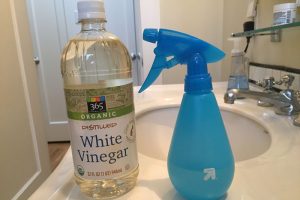Shine On with Natural Cleaners
As the number of household cleaning products has increased, so have the amount of unsafe chemical combinations in our window cleaners, oven cleaners, bathtub scrubbers and wood shiners. Most products on the market today feature paragraph-long ingredient lists, including artificial colors and fragrances and harsh cleansing agents like bleach, ammonia and acids. Synthetic cleaners contribute to indoor air pollution by giving off fumes that can irritate eyes, skin and lungs. Children and pets are particularly at risk for these harmful effects. Some products also contain unnecessary antibacterial agents which have been shown to promote the growth of antibacterial resistant organisms. Fortunately, synthetic cleaners are based on natural ingredients and can be easily replicated. By using these natural formulas, you can create your own cleaning solutions that are just as effective, but less toxic and less expensive.
A caveat: Try these solutions on a small area first since not all surfaces may react the same way.
The Bathroom

The bathroom tends to attract the most toxic scrubbing agents to combat mold, mildew and soap scum. There are a number of natural ingredients that can have the same effect as bleach and ammonia, but without the toxic fumes and residue left behind. Lemons have similar properties to bleach, and can be used to dissolve soap scum and hard water deposits. To combat soap scum or stains on tile, cut a lemon in half and dip it into a bowl of kosher salt, then start scrubbing the tile.
The slightly acidic nature of white vinegar makes it effective at dissolving grease, soap scum and lime deposits from smooth surfaces in the kitchen and bathroom. You can apply concentrated lemon juice and vinegar in a spray bottle if you’re working on a particularly large surface area. Mix 1 tablespoon of vinegar and 1 tablespoon of lemon juice per quart of water. Vinegar solutions also work to disinfect surfaces, such as toilet bowls.
To get the effect of a creamy soft scrubber for tile, mix half a cup of baking soda into a bowl with enough liquid detergent to mimic the texture of cake frosting. Scoop the mixture onto a sponge and wash the tile surface. Baking soda not only deodorizes, but also acts as a cleaning and brightening abrasive that rivals traditional powdered cleansers. Baking soda solutions also leave no gritty residue. To save your baking soda solution for later use, add 1 teaspoon of vegetable glycerin so the solution doesn’t dry out and store it in a sealed glass container.
The Kitchen
Kitchen appliances, especially ovens, get scrubbed down with abrasive cleansers that can leave gritty residue and cause skin and eye irritation. To remove stains or clean the inside of a messy oven, allow a baking soda and water paste to set for several minutes before rinsing; to boost the abrasive action for tougher cleaning jobs, add kosher salt to the paste.
To knock out germs without the added antibiotic solutions, mix 2 cups of water, 3 tablespoons of liquid soap and 20 to 30 drops of tea tree oil. Spray or rub on countertops and other kitchen surfaces, and do not rinse after it’s wiped away. Tea tree oil solutions can also be used in the bathroom to combat mold and mildew on tile, shower curtains or ceilings.
Glass Surfaces
An effective window cleaner can be made by mixing ¼- ½ teaspoon of liquid detergent, 2 tablespoons of vinegar and 2 cups of water in a spray bottle. The soap in this recipe cuts the wax residue from the commercial brands you may have used in the past. Wiping glass surfaces with newspaper rather than a paper towel eliminates streaking. If you do not like the strong smell of vinegar, you can substitute it with undiluted lemon juice or club soda.
Wood Surfaces
White vinegar is a gentle enough solution to use on wooden surfaces, especially wood floors. Mix 1/4 to 1/2 cup of vinegar with warm water in a bucket or spray bottle. To produce added shine, blend 1 cup of olive oil and 1/2 cup of lemon juice in a spray bottle, mist onto a soft cloth and polish the wood. Polishing with olive oil moisturizes wood and creates a shine; lemon juice cleans the surface and leaves behind a fresh scent. For a less oily formula, mix ¼ cup white vinegar with a few drops of oil. Olive oil should not be used on hardwood floors.
Fabrics and Carpets
Baking soda is the most natural deodorizer, and can be applied to carpets and fabrics to freshen them prior to vacuuming. Sodium borate, or borax, has a long history as a nontoxic powdered laundry booster. Remove stains from fabrics before washing by rubbing a paste of dishwasher detergent and sodium borate into the fabric and rinsing. Hydrogen peroxide works well to fizz away perspiration stains on white fabrics. Keep a spray bottle filled with a peroxide and water mixture near the washing machine; spray spots and rinse with clean water before starting the machine. If you need to safely remove stains from colored fabrics, try club soda or diluted vinegar instead.

